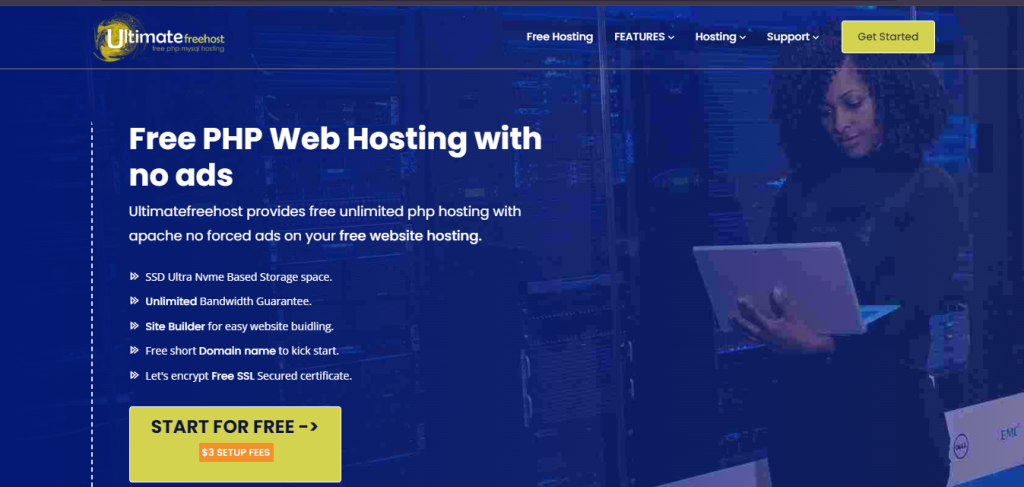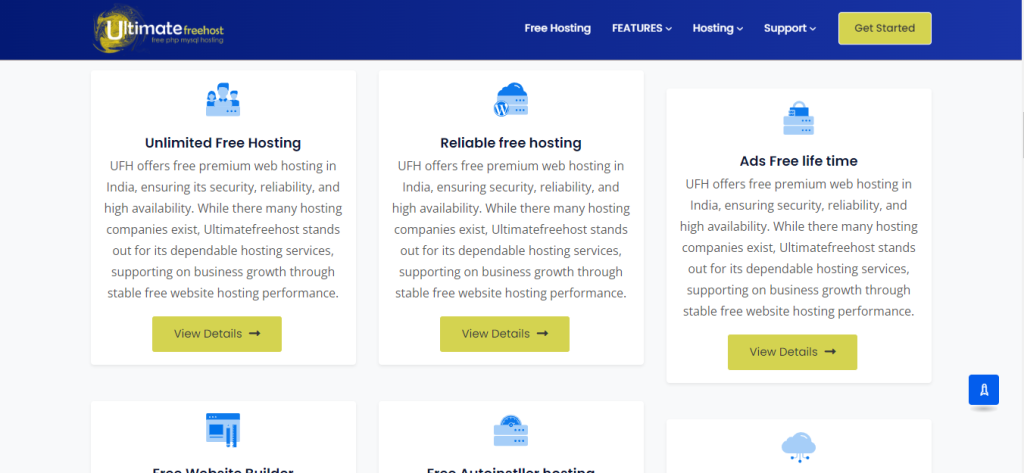In the digital age, free web hosting is a game-changer for anyone looking to transform a simple hobby into a thriving online business. Whether you’re passionate about photography, writing, crafting, or any other interest, the availability of free web hosting has democratized the opportunity to share your work with the world, test your ideas, and grow your venture without the burden of upfront costs.

Table of Contents
The Power of Free Web Hosting

Free web hosting platforms provide a valuable starting point for budding entrepreneurs. By eliminating the initial investment in website infrastructure, these platforms allow individuals to focus on developing their content, building their brand, and connecting with their audience. Let’s dive into the journey from hobby to hustle and explore how you can leverage free web hosting to turn your side project into a successful online business. You can also opt for free web hosting.
Real-Life Success Stories
Case Study 1: Photography Passion Turned Professional
Emily started with a simple blog showcasing her photography. Using free web hosting from platforms like WordPress.com, she uploaded her portfolio and shared tips on capturing stunning images. Gradually, her blog attracted a following, and she began offering photography tutorials and online courses. Today, Emily runs a successful online photography school and sells her prints worldwide.
Case Study 2: Crafting Enthusiast’s E-commerce Empire
John loved creating handmade crafts and initially shared his projects on social media. He decided to create a website using free web hosting from Wix.com to showcase his products. The professional appearance of his website helped him gain credibility, and soon, he was receiving orders from across the globe. John’s side project has now evolved into a full-fledged e-commerce business.
Case Study 3: Writer’s Blog Blossoms into a Content Agency
Sarah enjoyed writing and started a blog to share her thoughts and stories. Using free web hosting on Blogger, she consistently published engaging content. Her blog’s popularity grew, leading to freelance writing opportunities. Eventually, Sarah founded a content agency that provides writing services to businesses, transforming her hobby into a lucrative venture.
Practical Tips for Maximizing Free Web Hosting

- Choose the Right Platform: Select a free web hosting service that aligns with your project’s needs. Platforms like WordPress.com, Wix, and Weebly offer user-friendly interfaces and various customization options.
- Optimize Your Website: Ensure your website is fast, responsive, and easy to navigate. Use high-quality images and engaging content to keep visitors interested.
- Leverage Social Media: Promote your website on social media to drive traffic and build a community around your brand. Engage with your audience and encourage them to share your content.
- SEO Optimization: Use relevant keywords, including free web hosting, to improve your website’s search engine ranking. Write compelling meta descriptions and use alt tags for images.
- Monetize Your Site: Explore various monetization strategies such as affiliate marketing, sponsored content, and selling products or services. Integrate e-commerce functionality if applicable.
- Analyze and Adapt: Use tools like Google Analytics to track your website’s performance. Analyze the data to understand your audience’s behavior and make informed decisions to improve your site.
Strategies for Growing Your Online Business
- Consistent Content Creation: Regularly update your website with fresh, valuable content. This keeps your audience engaged and encourages repeat visits.
- Build an Email List: Collect email addresses from visitors and send newsletters to keep them informed about new content, products, or promotions.
- Network with Influencers: Collaborate with influencers in your niche to expand your reach. Their endorsement can bring new visitors to your site.
- Offer Freebies: Provide free resources like e-books, guides, or templates to attract visitors and encourage them to share your site.
- Create a Professional Brand: Invest in a professional logo, branding materials, and a cohesive design to build trust and credibility.
- Engage with Your Audience: Respond to comments, emails, and social media messages. Building a relationship with your audience fosters loyalty and encourages word-of-mouth promotion.
The Benefits of Free Web Hosting
- Cost Savings: The most obvious benefit of free web hosting is the cost savings. It allows you to start your online business without a significant financial investment.
- Ease of Use: Most VPS hosting platforms offer user-friendly interfaces and drag-and-drop functionality, making it easy for anyone to create a website.
- Scalability: As your business grows, many free web hosting services offer premium plans with additional features and resources.
- Support and Community: Many free web hosting platforms provide access to support forums and communities where you can get help and connect with other users.
Overcoming Challenges with Free Web Hosting
While free web hosting offers numerous benefits, it also comes with some limitations. Here are a few challenges you might face and how to overcome them:
- Limited Resources: Free plans often come with limited storage, bandwidth, and features. To overcome this, optimize your content and consider upgrading to a premium plan as your business grows.
- Ads and Branding: Some free web hosting services display ads or branding on your site. To maintain a professional appearance, look for platforms that offer ad-free options or consider upgrading.
- Limited Customization: Free plans may have restricted customization options. Use available tools creatively and explore third-party plugins or themes to enhance your site’s functionality.
- Support Limitations: Free users might have limited access to customer support. Utilize community forums, online tutorials, and knowledge bases to troubleshoot issues.
Practical Tips for Transitioning to Paid Hosting
As your online business grows, you might find the need to transition from free web hosting to a paid plan. Here are some practical tips to make the switch smoothly:
- Evaluate Your Needs: Assess your website’s current and future requirements, including storage, bandwidth, and features.
- Research Hosting Providers: Look for reputable hosting providers that offer scalable plans and reliable customer support.
- Backup Your Data: Before migrating, ensure you have a complete backup of your website’s content and data.
- Test the New Environment: Set up a test site on the new hosting platform to ensure everything functions correctly before making the final switch.
- Communicate the Change: Inform your audience about the transition and any potential downtime to manage their expectations.
- Monitor Performance: After the migration, closely monitor your website’s performance and address any issues promptly.
Conclusion
Free web hosting is a powerful tool that can help you turn your hobby into a thriving online business. By leveraging the benefits of free web hosting, you can focus on developing your content, building your brand, and connecting with your audience without the burden of upfront costs. With the right strategies and determination, you can overcome challenges and grow your side project into a successful venture.
FAQs
What is free web hosting?
Free web hosting is a service that allows individuals to create and host websites without any cost. These services typically offer basic features and resources to help users get started.
Can I monetize a website on free web hosting?
Yes, you can monetize a website on free web hosting through various methods such as affiliate marketing, sponsored content, and selling products or services.
Are there any limitations to free web hosting?
Free web hosting often comes with limitations such as limited storage, bandwidth, customization options, and the presence of ads or branding. However, these limitations can be managed or mitigated with strategic planning.
How do I choose the right free web hosting platform?
Choose a free web hosting platform that aligns with your project’s needs. Consider factors such as ease of use, customization options, and the availability of support and community resources.
When should I consider upgrading to a paid hosting plan?
Consider upgrading to a paid hosting plan when your website outgrows the resources provided by free web hosting, when you need advanced features, or when you want to remove ads and branding from your site.
Can I migrate my website from free web hosting to a paid hosting plan?
Yes, you can migrate your website from free web hosting to a paid hosting plan. Ensure you back up your data, test the new environment, and inform your audience about the transition to manage their expectations.
What are some popular free web hosting platforms?
Popular free web hosting platforms include WordPress.com, Wix, Weebly, and Blogger. Each platform offers different features and benefits, so choose the one that best suits your needs.
How can I optimize my website on free web hosting?
Optimize your website on free web hosting by ensuring it is fast, responsive, and easy to navigate. Use high-quality images, engaging content, and implement SEO best practices to improve your site’s performance.
Bonus Content: 5 Free Web Hosting Platforms to Get You Started
- WordPress.com: Known for its ease of use and customization options, WordPress.com is ideal for bloggers and small businesses.
- Wix: Wix offers a drag-and-drop interface, making it easy to create visually appealing websites without any coding knowledge.
- Weebly: Weebly provides a user-friendly platform with a range of templates and e-commerce functionality for those looking to sell products online.
- Blogger: A great option for writers, Blogger offers a simple platform to publish and share content with an audience.
- Jimdo: Jimdo is perfect for small businesses, offering easy-to-use tools for creating professional websites and online stores.
Advanced Tips and Tools for Leveraging Free Web Hosting to Scale Your Online Business
Building a website with free web hosting is a fantastic start, but transforming your side project into a thriving online business requires ongoing effort and strategy. In this bonus content, we’ll delve deeper into advanced tips and tools that can help you maximize the potential of free web hosting and scale your online business effectively.
Advanced SEO Strategies for Free Web Hosting
- Keyword Research and Integration:
- Conduct thorough keyword research using tools like Google Keyword Planner, Ahrefs, or SEMrush. Identify high-traffic, low-competition keywords relevant to your niche.
- Integrate these keywords naturally into your website content, meta descriptions, image alt tags, and URLs. Maintain a keyword density of around 1% to avoid keyword stuffing.
- Content Optimization:
- Focus on creating high-quality, informative, and engaging content that addresses your audience’s needs and interests. Regularly update your content to keep it fresh and relevant.
- Use internal linking to connect related content within your website. This not only improves navigation but also helps search engines understand your site structure.
- Mobile Optimization:
- Ensure your website is mobile-friendly, as a significant portion of web traffic comes from mobile devices. Use responsive design techniques to provide a seamless experience across all devices.
- Test your website’s mobile performance using tools like Google’s Mobile-Friendly Test and make necessary adjustments.
- Page Speed Optimization:
- Page speed is a critical factor for both user experience and SEO. Optimize your website’s loading time by compressing images, minimizing code, and leveraging browser caching.
- Use tools like Google PageSpeed Insights and GTmetrix to analyze your website’s speed and identify areas for improvement.
Utilizing Social Media to Amplify Your Reach
- Create a Social Media Strategy:
- Develop a comprehensive social media strategy that includes content planning, posting schedules, and engagement tactics. Identify the platforms where your target audience is most active.
- Use social media management tools like Hootsuite or Buffer to schedule posts and monitor engagement across multiple platforms.
- Engage with Your Audience:
- Respond promptly to comments, messages, and mentions on social media. Engage with your audience by asking questions, running polls, and sharing user-generated content.
- Collaborate with influencers and industry leaders to expand your reach and credibility. Their endorsement can introduce your brand to new audiences.
- Leverage Paid Advertising:
- While free web hosting helps you save on initial costs, investing in paid social media advertising can significantly boost your visibility and traffic. Platforms like Facebook Ads and Instagram Ads offer targeted advertising options.
- Experiment with different ad formats such as carousel ads, video ads, and sponsored posts to find what works best for your audience.
Email Marketing: Building and Nurturing Your Subscriber List
- Create Compelling Lead Magnets:
- Offer valuable lead magnets such as e-books, guides, checklists, or templates in exchange for email addresses. Ensure these resources are highly relevant to your audience’s interests.
- Promote your lead magnets on your website, blog, and social media channels to attract subscribers.
- Segment Your Email List:
- Segment your email list based on subscriber interests, behaviors, and demographics. This allows you to send personalized and targeted content, increasing engagement and conversion rates.
- Use email marketing platforms like Mailchimp, ConvertKit, or AWeber to manage your list and create segmented campaigns.
- Nurture Your Subscribers:
- Send regular newsletters that provide value, such as industry insights, tips, updates, and exclusive offers. Maintain a consistent sending schedule to keep your audience engaged.
- Use automated email sequences to nurture new subscribers. For example, send a welcome series that introduces your brand, shares your best content, and encourages further engagement.
Leveraging Analytics for Data-Driven Decisions
- Set Up Google Analytics:
- Install Google Analytics on your free web hosting site to track visitor behavior, traffic sources, and conversions. This data provides valuable insights into what’s working and what needs improvement.
- Set up goals and conversion tracking to measure the success of your marketing efforts and website performance.
- Analyze User Behavior:
- Use heatmaps and session recordings from tools like Hotjar or Crazy Egg to understand how visitors interact with your site. Identify popular sections, click patterns, and areas of friction.
- Analyze this data to make informed decisions about website design, content placement, and user experience enhancements.
- Track Key Performance Indicators (KPIs):
- Identify and track KPIs relevant to your business goals, such as website traffic, bounce rate, average session duration, conversion rate, and revenue.
- Regularly review your analytics reports to identify trends, monitor progress, and adjust your strategies accordingly.
Monetization Strategies Beyond Basics
- Affiliate Marketing:
- Partner with brands and companies that align with your niche and audience. Promote their products or services through affiliate links on your website and earn a commission on sales.
- Create detailed and honest product reviews, comparison guides, and tutorials to provide value to your audience and encourage conversions.
- Sponsored Content:
- Collaborate with brands to create sponsored content such as blog posts, videos, or social media posts. Ensure the content aligns with your brand and provides value to your audience.
- Be transparent about sponsored content and disclose partnerships to maintain trust with your audience.
- Digital Products and Services:
- Develop and sell digital products such as e-books, courses, templates, and software. Digital products have low production costs and can be sold repeatedly.
- Offer services related to your expertise, such as consulting, coaching, design, or writing. Use your website to showcase your skills and attract clients.
Enhancing User Experience (UX) and User Interface (UI)
- Intuitive Navigation:
- Design a clear and intuitive navigation structure that allows visitors to easily find information. Use descriptive menu labels and organize content logically.
- Implement a search functionality to help users quickly locate specific content on your site.
- Compelling Visual Design:
- Invest in high-quality visuals, including images, videos, and graphics, to create a visually appealing website. Use a consistent color scheme, typography, and branding elements.
- Ensure your website design is clean and uncluttered, focusing on usability and readability.
- Accessibility and Inclusivity:
- Make your website accessible to all users, including those with disabilities. Follow accessibility guidelines such as providing alt text for images, using proper heading structures, and ensuring keyboard navigation.
- Consider cultural and linguistic inclusivity by offering content in multiple languages and using diverse imagery.
Building a Community Around Your Brand
- Engage with Your Audience:
- Create opportunities for interaction and engagement on your website, such as forums, comment sections, and live chats. Encourage visitors to share their thoughts and feedback.
- Host virtual events like webinars, Q&A sessions, or live streams to connect with your audience in real time.
- User-Generated Content:
- Encourage your audience to contribute content, such as reviews, testimonials, photos, and videos. Showcase user-generated content on your website and social media to build a sense of community.
- Run contests and challenges that motivate users to participate and share their experiences with your brand.
- Loyalty Programs:
- Implement a loyalty program that rewards repeat customers and engaged community members. Offer incentives such as discounts, exclusive content, and early access to new products.
- Use gamification techniques to make the loyalty program engaging and fun, encouraging ongoing participation.
Utilizing Content Marketing for Growth
- Develop a Content Calendar:
- Plan your content in advance using a content calendar. This helps you maintain consistency and ensures a steady flow of fresh content for your audience.
- Include a mix of content types, such as blog posts, videos, infographics, and podcasts, to cater to different preferences.
- Create Evergreen Content:
- Focus on creating evergreen content that remains relevant and valuable over time. This type of content continues to attract traffic and engagement long after it’s published.
- Update and repurpose evergreen content periodically to keep it current and maximize its value.
- Guest Blogging and Collaborations:
- Write guest posts for reputable websites and blogs in your niche. This helps you reach new audiences and build backlinks to improve your SEO.
- Collaborate with other content creators and industry experts to co-create content, such as interviews, roundups, and joint webinars.
Conclusion
Transitioning your side project into a thriving online business is an exciting journey, and free web hosting provides a valuable foundation to get started. By implementing advanced strategies for SEO, social media, email marketing, analytics, monetization, user experience, community building, and content marketing, you can maximize the potential of free web hosting and scale your online business effectively.
Remember, success doesn’t happen overnight. Stay committed, continuously learn and adapt, and leverage the power of free web hosting to achieve your entrepreneurial goals. With determination and the right strategies, your hobby can indeed become a profitable and fulfilling online venture.
